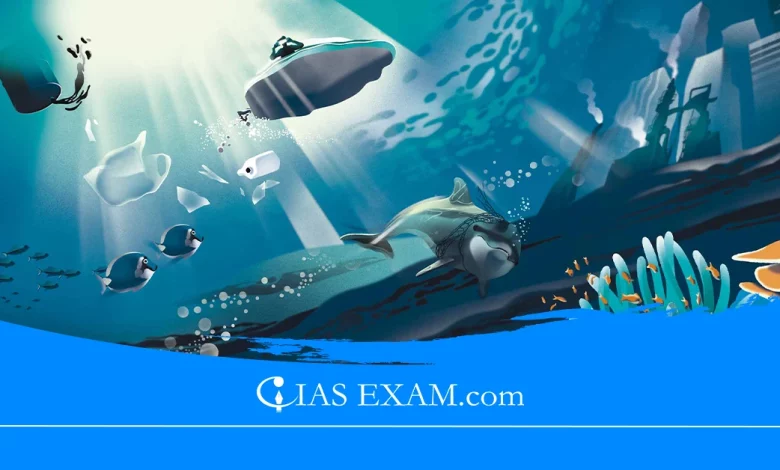Daily Current Affairs for UPSC
Inter-Ministerial Joint Workshop on Blue Economy
Syllabus- Economy [GS Paper-3]

Context
The Ministry of Earth Sciences has recently hosted the Inter-Ministerial Joint Workshop on Blue Economy.
About
- MoES has engaged with the World Bank as a knowledge companion to undertake a technical observation and prepare a document titled ‘India’s Blue Economy: Pathways for resource-efficient, inclusive and resilient growth in India’.
- The document is predicted to cover the areas related to global best-quality practices in Blue Economy implementation, ocean accounting framework, iinstitutional strengthening and innovative finance mechanisms towards implementing the Blue Economy Policy framework.
About the Blue Economy
- It is referred to as the sustainable use of ocean resources for economic growth, improved livelihoods, and jobs while retaining the health of the ocean environment.
India’s Blue Economy
- India has a 7,517 km long shoreline and Exclusive Economic Zone (EEZ) of over million square km is rich in living and non-living assets.
- India’s blue economy accounts for about 4% of the GDP and is expected to increase once the mechanism is improved.
- The coastal economy also sustains over four million fisherfolk and different coastal communities.
- Four primary industries in India can fuel its blue economy; fishing, aquaculture, ports, and transport.
Significance of the Blue Economy
- Economic Growth: The Blue Economy affords considerable opportunities for economic growth by sectors including fisheries, aquaculture, tourism, maritime transport, renewable strength, and biotechnology.
- Resource Utilization: It promotes the sustainable utilization of marine assets, which includes fish shares, minerals, and electricity sources, ensuring their availability for current and future generations.
- Renewable Energy: The Blue Economy encourages the development of renewable energy assets including offshore wind, wave, and tidal power, reducing dependence on fossil fuels and mitigating climate change.
- Tourism: Coastal and marine tourism is a key component of the Blue Economy, generating revenue, employment, and supporting local economies in coastal regions.
- Climate Change Mitigation: Healthy oceans play an essential function in regulating the Earth’s climate.
- The Blue Economy promotes conservation efforts and sustainable practices that assist in mitigating the effects of climate change, including retaining coastal ecosystems and lowering carbon emissions.
- Biodiversity Conservation: By promoting sustainable practices and accountable control of marine sources, the Blue Economy contributes to the conservation of marine biodiversity and the protection of endangered species and habitats.
Challenges
- Pollution and environmental degradation: India’s coastal regions face sizable pollutants from various assets, which includes commercial discharge, untreated sewage, agricultural runoff, and plastic waste.
- Pollution harms marine ecosystems, influences biodiversity, and undermines the sustainability of fisheries and other marine industries.
- Overexploitation of marine resources: Illegal, unreported, and unregulated (IUU) fishing exacerbates the trouble, leading to depletion of fish stocks and lack of livelihoods for coastal communities.
- Climate change influences: Rising ocean degrees, ocean acidification, and changes in ocean temperature and currents due to climate change have an effect on fisheries, aquaculture, coastal infrastructure, and biodiversity.
- Maritime protection demanding situations: India’s maritime security is threatened by different factors, which includes piracy, illegal trafficking, maritime terrorism, and territorial disputes.
- Limited institutional potential and infrastructure: Developing and dealing with the blue economy demands strong institutional frameworks, governance mechanisms, and infrastructure.
Steps Taken by Government of India to Promote Blue Economy
- National Policy Framework: Government has formulated a National Policy Framework for the Blue Economy, which presents a strategic roadmap for sustainable improvement and control of marine assets.
- The framework aims to combine various sectors which include fisheries, aquaculture, shipping, tourism, and renewable power to promote holistic growth.
- Sagarmala Programme: The Sagarmala Programme is a flagship initiative aimed toward modernizing India’s ports, enhancing port connectivity, and promoting port-led improvement.
- It focuses on optimizing logistics efficiency, promoting coastal delivery, and growing coastal financial zones to stimulate economic growth and create employment opportunities.
- National Marine Fisheries Action Plan (NMFAP): The plan consists of measures to improve fishery sources assessment, enhance infrastructure and era inside the fisheries sector, and promote aquaculture improvement.
- Blue Economy Cell: The Ministry of Earth Sciences has established a committed Blue Economy Cell to coordinate studies, policy components, and implementation of Blue Economy projects.
- Integrated Coastal Zone Management (ICZM): The government has implemented the Integrated Coastal Zone Management Program to promote sustainable development and conservation of coastal ecosystems.
- Marine Spatial Planning (MSP): India has initiated efforts to expand Marine Spatial Planning frameworks to make sure green and sustainable use of marine space.
Way Ahead
- The Blue Economy in India is poised for significant growth in the next few years.
- The Blue Economy Mission undertaken through the government can result in the world becoming the subsequent monetary multiplier, depending on the execution of the policies that have been determined.
- The zone is the sixth dimension of the government’s ‘Vision of New India through 2030’; with the Blue Economy rules aiming for long-term economic benefits which will obtain the greater goals of increase, activity advent, equity, and environmental protection.
Source: PIB
UPSC Mains Practice Question
Q.“Blue economy presents a new scope for economic activities with great potential”. In light of this statement discuss the significance and the initiatives taken by the Govt of India to promote the blue economy





.png)



